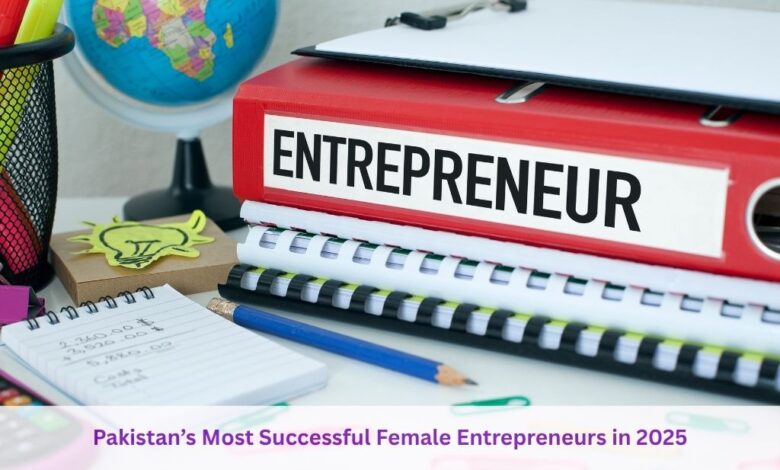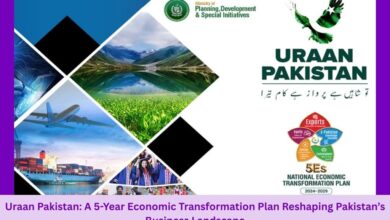Pakistan’s Most Successful Female Entrepreneurs in 2025

One of the most uplifting and strong developments in the Pakistan’s fast changing entrepreneurial environment is the growth of female entrepreneurs. Women in Pakistan are making ripples in sectors ranging from technology to textiles, health to hospitality, and education to e-commerce, no more limited by stereotypes or restricted by outmoded ideas. Pakistani women are redefining corporate success with inventiveness, resilience, and sheer will despite cultural expectations, infrastructure gaps, and social obstacles. Here’s a well picked list of female entrepreneurs who are not only developing companies but also defining Pakistan’s future as 2025 approaches.
1. Saba Gul

The Creative Social Reformer Saba Gul, an MIT graduate, came back to Pakistan not only to invent but also to empower. Popinjay, a premium clothing brand that combines sophisticated design with ethical principles, was co-founded by her. Popinjay’s great dedication to giving rural Pakistani women employment and dignity via embroidery projects sets it apart. Her company combines fashion and social effect. Saba is more developing her model into digital platforms in 2025, hence enabling these artisan women to globally sell their stories together with their craft. She helps us remember that design has a conscience and a goal.
2. Roshaneh Zafar

Microfinance expert Though not fresh to the business world, Roshaneh Zafar continues to be among the most effective drivers of financial independence for women. Being the originator of Kashf Foundation, she has been a pioneer in microfinance, providing small loans to women to launch and expand their enterprises. Kashf’s fresh digital training initiatives and e-learning tools are transforming financial literacy distribution throughout Pakistan in 2025. At the grassroots level, where results are both palpable and transformative, Roshaneh’s work is still producing actual change.
3. Nabeha Latif – Tech with Empathy
Nabeha Latif is shattering silence in a society that has long been considered taboo in Pakistan as Raaji’s co-founder, a chatbot designed to teach young women about sexual and reproductive health. Raaji has become a quiet teacher, available anytime and everywhere in a culture when health literacy and body autonomy are sometimes disregarded. Bringing crucial knowledge to neglected areas, Nabeha is partnering with schools and NGOs in 2025 to expand Raaji’s influence outside of cities. Her capacity to combine compassion with technology makes her a game-changer in femtech.
4. Mahin Khan: The Ethical Fashion
Revivalist One of Pakistan’s leading designers, Mahin Khan is redefining herself for the present age. Known for her extensive knowledge of classic workmanship, she is currently concentrating on sustainable fashion, from zero-waste manufacture to eco-friendly fabrics. Launched in 2024, her new brand highlights ‘conscious couture,’ which reintroduces handwoven textiles, natural dyes, and regional craftwork into worldwide prominence. Mahin’s classes for aspiring designers in 2025 are enabling a new generation to mix creativity with environmental responsibility.
5. Sidra Qasim
E-Commerce Disruptors-founder of Atelier by Markhor, a premium leather goods company praised globally for its dedication to quality and narrative, Sidra Qasim But Sidra’s most recent venture, Work play Studios, is far bigger. This design and innovation hub helps emerging Pakistani companies in product design, branding, and e-commerce foundation. She is guiding dozens of companies in 2025, mostly women-led ones, to obtain worldwide exposure by means of sites such as Amazon and Etsy. Sidra sees women and digital as retail’s future.
6. Khadija Shah
Khadija links contemporary and legacy. Khadija Shah is no stranger to achievement; she is the power behind Élan. Her turn toward Pakistani luxury lifestyle not only clothing but also home décor, health, and experiences based on heritage makes her intriguing in 2025. Ayyari, her latest project, seeks to be a whole sensory tour of Pakistani design. She is developing a new narrative for what Pakistani luxury means, not just creating a brand. With regional sourcing and worldwide exposure, Khadija is creating a legacy spanning countries.
7. Amna Nawaz
Media for ChangeCo-founder of The Media Lab, Amna Nawaz has devoted her career to examining the convergence of advocacy, digital narrative, and journalism. Her 2025 platform is innovating story-driven social initiatives illuminating gender violence, climate change, and young mental health. Amna is giving a voice to the voiceless and motivating others to take action by means of podcasts, mini-documentaries, and viral movements. Her work reminds us that in the modern day, storytelling is also activism not only entertainment.
8. Komal Rizvi:
Entertainment and Enterprise Unite Most known for her music career, Komal Rizvi took an unanticipated direction with Truly Komal, a skincare brand aimed at reasonably priced, dermatologist-tested products for the South Asian market. Her brand is also penetrating international markets by 2025 in addition to being a regional hit. Her company mirrors her main goal of using affordable beauty products to promote confidence and care. Ensuring that high-quality beauty services reach beyond the affluent, Komal is now opening tier-2 city skin clinics.
9. Zainab Tariq:
Changing Availability of Mental Health Founder of Therapy Hub and a clinical psychologist, Zainab has brought mental health from whispered discussions into the public eye. She is providing therapy services both online and in low-cost walk-in centres utilizing a team of female psychologists. Targeted for a Pakistani audience, her app-based solution in 2025 offers multilingual counselling, guided meditations, and AI-backed emotional wellness trackers. Though audacious but basic, Zainab aims to make therapy as natural as a doctor appointment.
10. Scaling Startups:
Fatima Mazhar Formerly connected with the fast-growing startup Bazaar Technologies, Fatima Mazhar now mentors early-stage women-led companies via her She Scales program. Recognizing the financial disparity women experience, Fatima’s platform links female entrepreneurs with investors, accelerators, and markets. She Scales is holding accelerator cohorts in Karachi, Lahore, and Peshawar in 2025, developing women not just to launch but also to lead and scale.
Why 2025 Is the Year of the Pakistani Woman Entrepreneur
These amazing women’s stories are narratives of cultural change rather than just business case studies. Pakistan is a nation of great talent and tenacity; when women are given opportunity to lead, the outcomes are nothing short of transforming. Particularly remarkable in 2025 is how female entrepreneurs are no longer only managing “female-oriented” companies. Finance, health, technology, agriculture, fashion, and more are being interrupted. They are investors, legislators, technologists, and artists. They are employing teams, changing world markets, and breaking the norms. Challenges They Still Encounter Although these women are very bright, the road still presents obstacles:Less than 5% of venture capital in Pakistan goes to companies run by women.
Societal pressure: Managing family obligations with work is yet a tightrope act. Visibility Problems: Many women battle to get media coverage or networking access as opposed to their male counterparts. Still, Pakistani women are showing up and showing how it is done despite these obstacles. The Future RoadSupporting women entrepreneurs is crucial for economic growth, not merely a “nice” thing to do. World Bank projections suggest that women’s equal contribution to Pakistan’s economy may raise GDP by more than 30%. But more than that, these businesspeople are role models. Every girl in a small village dreaming of coding, every housewife with a recipe and a desire, and every student envisioning a future other from history, these women prove it’s feasible.
Pakistan ought to be watched globally in 2025. And when it does, it will see women strong, intelligent, and unstoppable spearheading the charge. Last Remarks The entrepreneurial attitude of Pakistani women is not a fad. It’s a movement. A revolution not loudly proclaimed in the streets but constructed slowly — boardroom by boardroom, product by product, idea by idea. These women business owners are to be celebrated, supported, and learned from rather than only to be observed. Since societies rise along with women. It is becoming more and more evident as we approach 2025 that Pakistan’s women businesspeople are not simply a fad but rather a major change.
These women are fostering ecosystems of change rather than just building companies. Every company, whether it derives from technology, fashion, finance, or social welfare, has a narrative of resilience, ambitious vision, and a rejection of remaining silent or static. They are demonstrating that one does not have to sacrifice compassion for success and that effective leadership does not have to conform to the typical masculine ideal. Today’s female-led companies are more socially aware, environmentally motivated, and community-cantered than ever.
These entrepreneurs are guiding younger women, honouring local craftspeople, raising marginalized voices, and claiming stories about womanhood, job, and value. It’s not anymore about being ‘the first’ or ‘the only,’ but about opening the door wider for those coming after. Though obstacles including restricted funds, social attention, and absence of institutional support still exist, they are no longer sufficient to bring the momentum to a halt. These women show not just bravery but also brilliance in action. Their tales help us to realize that talent transcends gender and is not limited by location.
Their current influence will inspire girls in homes and classrooms all over Pakistan to dream big and work harder, thereby cascading through future generations. They construct their own platforms rather than wait for approval. By doing this, they are shaping the future rather than merely altering Pakistan’s business profile. And that future appears very female.




